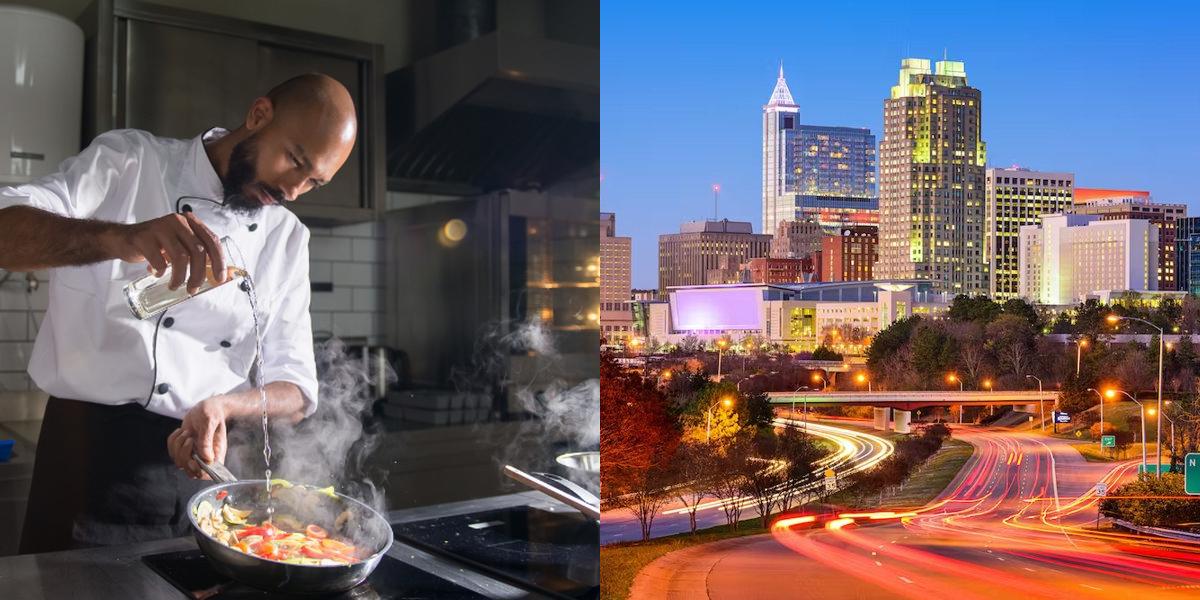How to Become a Chef in North Carolina (2024)

Are you passionate about cooking and want to pursue a career as a chef in North Carolina? Culinary arts might be the perfect path for you. In this blog post, we will explore what culinary arts is, the responsibilities of a culinary arts professional, where they work, the requirements to become a culinary arts professional in North Carolina, and where you can find culinary arts classes in the state.
Summary:
- In North Carolina, becoming a chef requires a high school diploma or GED, culinary training, and obtaining necessary permits like a food handler's permit and a business license if starting your own venture.
- Culinary training programs in North Carolina typically take 1-2 years to complete, providing essential skills and hands-on experience.
- Chefs in North Carolina earn an average salary of $63,100 per year, though this can vary based on experience and workplace.
- Culinary arts certification opens doors to various careers, from becoming a chef or pastry chef to exploring roles in catering, food writing, or culinary instruction.
What are the requirements to become a Chef in North Carolina?
To become a culinary arts professional in North Carolina, you need to meet both educational and legal requirements. A high school diploma or GED is typically required for entry into culinary arts programs, which are highly recommended for acquiring essential skills and hands-on experience. Dreambound, a leading platform for vocational training, offers culinary classes in North Carolina to help you gain these skills. Legally, you must obtain a food handler's permit to ensure knowledge of food safety practices. Additionally, if you plan to start your own culinary business, securing a business license from the state is essential.
How long does it take to become a Chef in North Carolina?
Becoming a chef in North Carolina is a journey that can take different paths. If you decide to go to culinary school, it usually takes about 1-2 years to complete the program. But that’s just the beginning. To really grow into a chef, you’ll spend several more years working in kitchens, learning the ropes in various roles. On average, it might take 4-8 years to move from entry-level positions to becoming a chef, depending on how quickly you gain experience and the opportunities you find along the way.
How much does a Chef make in North Carolina?
In North Carolina, chefs earn an average of $63,100 per year, which works out to around $29.47 per hour. But keep in mind, earnings can vary a lot depending on where you work, the type of restaurant, and your experience level. Chefs in high-end restaurants or those with more experience can earn significantly more.
Can you be a Chef in North Carolina with no experience?
Yes, it’s possible to become a chef in North Carolina without prior experience, but it will require time and dedication. Most successful chefs start in entry-level kitchen positions, such as prep cooks or dishwashers, and work their way up. Gaining experience, learning from seasoned chefs, and continually honing your skills are key steps in building a successful culinary career from the ground up.
Final Thoughts
Obtaining a culinary arts certification is an excellent starting point for anyone looking to pursue a career in the culinary industry. By researching culinary arts programs, enrolling in a program, gaining practical experience, and obtaining certification, you can develop the skills and knowledge necessary to succeed in the field.
To increase your chances of finding a job as a culinary arts professional, update your resume, build a professional network, apply for entry-level positions, gain additional certifications, and continue learning and honing your skills. Be persistent and patient in your job search, and showcase your creativity and passion for cooking.
Once you have become a culinary arts professional, you can explore various career paths such as becoming a chef, pastry chef, caterer, restaurant manager, food writer or critic, food stylist, or culinary instructor. The culinary arts field offers a wide range of opportunities for growth and advancement.
Whether you aspire to work in a high-end restaurant, start your own catering business, or write a cookbook, a culinary arts certification can provide you with the foundation and skills needed to achieve your culinary dreams. So, take the first step and embark on an exciting culinary journey today.
Dreambound offers a window into various career paths, so if you're considering a shift in your career, browse through these articles:

Joanna Paragas is part of the Growth team at Dreambound. Her primary role involves creating various automation to streamline workflows and make tasks more efficient for the entire team. Beyond her professional endeavors, Joanna enjoys spending her free time playing with her dogs and enhancing her knowledge by enrolling in online courses.




